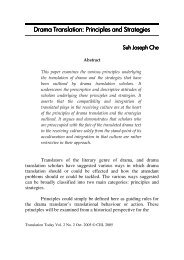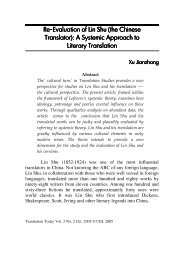- Page 1 and 2:
Editors:Udaya Narayana SinghP.P. Gi
- Page 3 and 4:
Contributors are requested to conta
- Page 5 and 6:
Central Institute of Indian Languag
- Page 7 and 8:
Translation TodayVOLUME 3, NOS. 1 &
- Page 9 and 10:
Translation in/and Hindi Literature
- Page 11 and 12:
looking at translation as an act to
- Page 13 and 14:
language, asserts his Brahmin ident
- Page 15 and 16:
questions about the matrix of ritua
- Page 17 and 18:
distraught relation with his own ab
- Page 19 and 20:
post-colonial phase promises to ope
- Page 21 and 22:
when English is used as a target or
- Page 23 and 24:
2 M. Asaduddinof middle eastern fab
- Page 25 and 26:
4 M. Asaduddinseems to work out in
- Page 27 and 28:
6 M. Asaduddinliteratures of the Mi
- Page 29 and 30:
8 M. Asaduddinthere emerged a secti
- Page 31 and 32:
10 M. Asaduddin…[T]he Indian worl
- Page 33 and 34:
12 M. AsaduddinIn the post-independ
- Page 35 and 36:
14 M. Asaduddinmoment of stringent
- Page 37 and 38:
16 M. Asaduddinexample of self-tran
- Page 39 and 40:
18 M. AsaduddinBhalla, Alok (ed) 19
- Page 41 and 42:
Translating Medieval Orissa 1Abstra
- Page 43 and 44:
22 Translating Medieval OrissaWith
- Page 45 and 46:
24 Translating Medieval Orissamuseu
- Page 47 and 48:
26 Translating Medieval Orissaprocl
- Page 49 and 50:
28 Translating Medieval Orissatexts
- Page 51 and 52:
30 Translating Medieval OrissaBecau
- Page 53 and 54:
32 Translating Medieval OrissaKalid
- Page 55 and 56:
34 Translating Medieval OrissaGita
- Page 57 and 58:
36 Translating Medieval Orissaliter
- Page 59 and 60:
38 Translating Medieval OrissaAmong
- Page 61 and 62:
40 Translating Medieval Orissaan in
- Page 63 and 64:
42 Translating Medieval Orissadivid
- Page 65 and 66:
44 Translating Medieval OrissaRamay
- Page 67 and 68:
46 Translating Medieval Orissaof th
- Page 69 and 70:
48 Translating Medieval Orissametap
- Page 71 and 72:
50 Translating Medieval OrissaThe a
- Page 73 and 74:
52 Translating Medieval Orissaident
- Page 75 and 76:
54 Translating Medieval Orissarelat
- Page 77 and 78:
56 Translating Medieval OrissaSansk
- Page 79 and 80:
58 Translating Medieval Orissaexamp
- Page 81 and 82:
60 Translating Medieval OrissaNOTES
- Page 83 and 84:
62 Translating Medieval Orissacateg
- Page 85 and 86:
64 Translating Medieval OrissaRamay
- Page 87 and 88:
66 Translating Medieval OrissaMishr
- Page 89 and 90:
68 Translating Medieval Orissa_____
- Page 91 and 92:
70 Translating Medieval OrissaAppen
- Page 93 and 94:
72 Translating Medieval OrissaHariv
- Page 95 and 96:
74 Translating Medieval OrissaDas60
- Page 97 and 98:
76 Translating Medieval Orissawitha
- Page 99 and 100:
78 Translating Medieval Orissawritt
- Page 101 and 102:
80 Translating Medieval Orissa149 S
- Page 103 and 104:
82 Translating Medieval OrissaKalid
- Page 105 and 106:
Translation Practices in Pre-coloni
- Page 107 and 108:
Translation Practices in Pre-coloni
- Page 109 and 110:
Translation Practices in Pre-coloni
- Page 111 and 112:
Translation Practices in Pre-coloni
- Page 113 and 114:
Translation Practices in Pre-coloni
- Page 115 and 116:
Translation Practices in Pre-coloni
- Page 117 and 118:
Translation Practices in Pre-coloni
- Page 119 and 120:
Translation Practices in Pre-coloni
- Page 121 and 122:
Translation Practices in Pre-coloni
- Page 123 and 124:
Translation Practices in Pre-coloni
- Page 125 and 126:
Translation Practices in Pre-coloni
- Page 127 and 128:
Translation Practices in Pre-coloni
- Page 129 and 130:
Translation Practices in Pre-coloni
- Page 131 and 132:
Translation Practices in Pre-coloni
- Page 133 and 134:
112 T. S. Satyanathinformation syst
- Page 135 and 136:
114 T. S. Satyanathhave claimed to
- Page 137 and 138:
116 T. S. Satyanathexpansion of the
- Page 139 and 140:
118 T. S. Satyanath2.3 Mention has
- Page 141 and 142:
120 T. S. SatyanathTamil and Hindi.
- Page 143 and 144:
122 T. S. Satyanathrenderings could
- Page 145 and 146:
124 T. S. Satyanathsometimes accomp
- Page 147 and 148:
126 T. S. SatyanathNOTES1. The summ
- Page 149 and 150:
Disputing Borders on the LiteraryTe
- Page 151 and 152:
Disputing Borders on the Literary T
- Page 153 and 154:
Disputing Borders on the Literary T
- Page 155 and 156:
Disputing Borders on the Literary T
- Page 157 and 158:
Disputing Borders on the Literary T
- Page 159 and 160:
Disputing Borders on the Literary T
- Page 161 and 162: Disputing Borders on the Literary T
- Page 163 and 164: Disputing Borders on the Literary T
- Page 165 and 166: Disputing Borders on the Literary T
- Page 167 and 168: IntroductionTranslation and the Ind
- Page 169 and 170: Translation and the Indian Traditio
- Page 171 and 172: Translation and the Indian Traditio
- Page 173 and 174: Translation and the Indian Traditio
- Page 175 and 176: Translation and the Indian Traditio
- Page 177 and 178: Translation and the Indian Traditio
- Page 179 and 180: Translation and the Indian Traditio
- Page 181 and 182: Translation and the Indian Traditio
- Page 183 and 184: Texts on Translation and Translatio
- Page 185 and 186: 164 Texts on Translation and Transl
- Page 187 and 188: 166 Texts on Translation and Transl
- Page 189 and 190: 168 Texts on Translation and Transl
- Page 191 and 192: 170 Texts on Translation and Transl
- Page 193 and 194: 172 Texts on Translation and Transl
- Page 195 and 196: 174 Texts on Translation and Transl
- Page 197 and 198: Towards a Theory of Rewriting: Draw
- Page 199 and 200: Towards a Theory of Rewriting: Draw
- Page 201 and 202: Towards a Theory of Rewriting: Draw
- Page 203 and 204: Towards a Theory of Rewriting: Draw
- Page 205 and 206: Chandrani Chatterjee184 Milind Mals
- Page 207 and 208: Chandrani Chatterjee186 Milind Mals
- Page 209 and 210: Chandrani Chatterjee188 Milind Mals
- Page 211: Chandrani Chatterjee190 Milind Mals
- Page 215 and 216: Chandrani Chatterjee194 Milind Mals
- Page 217 and 218: Chandrani Chatterjee196 Milind Mals
- Page 219 and 220: Chandrani Chatterjee198 Milind Mals
- Page 221 and 222: Chandrani Chatterjee200 Milind Mals
- Page 223 and 224: Chandrani Chatterjee202 Milind Mals
- Page 225 and 226: Chandrani Chatterjee204 Milind Mals
- Page 227 and 228: IntroductionTranslation in/and Hind
- Page 229 and 230: 208 Translation in/and Hindi Litera
- Page 231 and 232: 210 Translation in/and Hindi Litera
- Page 233 and 234: 212 Translation in/and Hindi Litera
- Page 235 and 236: 214 Translation in/and Hindi Litera
- Page 237 and 238: 216 Translation in/and Hindi Litera
- Page 239 and 240: 218 Translation in/and Hindi Litera
- Page 241 and 242: 220 Translation in/and Hindi Litera
- Page 243 and 244: 222 Translation in/and Hindi Litera
- Page 245 and 246: 224 Translation in/and Hindi Litera
- Page 247 and 248: 226 Translation in/and Hindi Litera
- Page 249 and 250: Translating Gujarati Fiction and Po
- Page 251 and 252: Translating Gujrati Fiction and Poe
- Page 253 and 254: Translating Gujrati Fiction and Poe
- Page 255 and 256: Translating Gujrati Fiction and Poe
- Page 257 and 258: Translating Gujrati Fiction and Poe
- Page 259 and 260: Translating Gujrati Fiction and Poe
- Page 261 and 262: Translating Gujrati Fiction and Poe
- Page 263 and 264:
Translating Gujrati Fiction and Poe
- Page 265 and 266:
Translating Gujrati Fiction and Poe
- Page 267 and 268:
Translating Gujrati Fiction and Poe
- Page 269 and 270:
Translation of Bhakti Poetry into E
- Page 271 and 272:
250 Sachin Ketkarshift’ precisely
- Page 273 and 274:
252 Sachin Ketkartranslator to over
- Page 275 and 276:
254 Sachin Ketkarfor a contemporary
- Page 277 and 278:
256 Sachin KetkarHe is resolute in
- Page 279 and 280:
258 Sachin Ketkarfield in an unprec
- Page 281 and 282:
260 Sachin Ketkarmarried girl in lo
- Page 283 and 284:
262 Sachin Ketkartwo cultures espec
- Page 285 and 286:
264 Sachin Ketkarproducing useless
- Page 287 and 288:
266 Sachin Ketkarare one. Krishna i
- Page 289 and 290:
268 Sachin KetkarDerrida, Jacques 1
- Page 291 and 292:
Translating Romantic Sensibility: N
- Page 293 and 294:
272 Rakesh Desaisubject, meant only
- Page 295 and 296:
274 Rakesh DesaiNarsinhrao Divetiya
- Page 297 and 298:
276 Rakesh Desaicontemporary realit
- Page 299 and 300:
278 Rakesh Desaiis about the same t
- Page 301 and 302:
280 Rakesh DesaiIn this context, Na
- Page 303 and 304:
Book reviewsLocating the ‘missing
- Page 305 and 306:
284 Book Reviewsnature of capital i
- Page 307 and 308:
286 Book ReviewsTheories on the Mov
- Page 309 and 310:
288 Book Reviewshas to do with the
- Page 311 and 312:
290 Book ReviewsFor, that is where
- Page 313 and 314:
292 Translation ReviewFirstly, Riml
- Page 315 and 316:
294 Translation Reviewmention it. S
- Page 317 and 318:
CONTRIBUTORSAsaduddin M. is Profess
- Page 319 and 320:
298 ContributorsEnglish. He has pub
- Page 321 and 322:
TRANSLATION TODAYORDERF O R MPlease

















